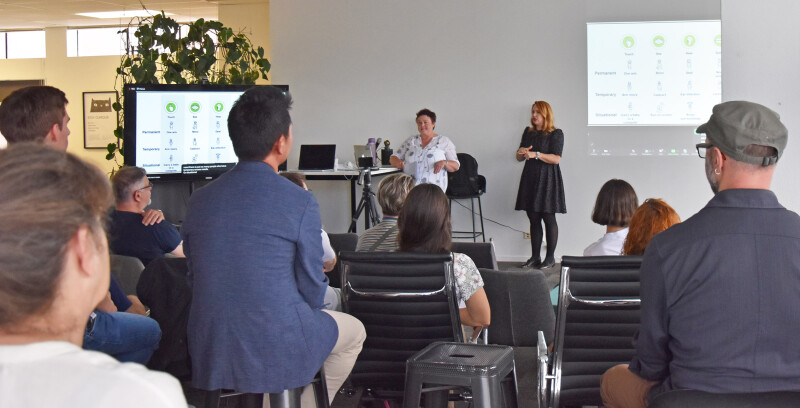MadeCurious is excited to now be running the UX CHCH Meetups!
For our first meetup of the year we had the pleasure of hosting a presentation by Dr Chandra Harrison from Access Advisors. Below is a summary of her talk.
These needs span various domains, from sensory and cognitive to dexterity and age-related constraints
Inclusive research, as emphasised, involves acknowledging this spectrum of diversity to ensure seamless access to digital platforms for all. To illustrate the significance of inclusive design, Chandra provided relatable scenarios, showcasing people she has worked with navigating everyday challenges. From a new mother multitasking while ordering groceries to a busy doctor utilising a tablet late at night, these examples underscored the necessity of accommodating diverse user experiences.
Chandra highlighted staggering statistics, revealing that 24% of the New Zealand population (17% globally) faces permanent access needs, while others may encounter temporary or situational challenges. This statistic really emphasised how relevant the presentation was going to be.
Why inclusive research matters and when to conduct inclusive research
The presentation underscored that inclusive research not only caters to a significant portion of the population but also serves as a compass for understanding user needs, driving innovation, and enhancing usability. Furthermore, it aligns with ethical principles, validating products and fostering a sense of social responsibility.
Chandra stressed the importance of integrating inclusive research early and consistently throughout the design process. From inception to launch and beyond, continual monitoring and feedback loops are essential to ensure digital accessibility remains a priority.
Methods of inclusive research and where and who to include
Diverse methodologies, including contextual interviews, observation, surveys, usability testing, and customer feedback, offer invaluable insights into user behaviours and preferences. Monitoring usage patterns and soliciting feedback from various channels are integral components of inclusive research practices.
Inclusive research initiatives should strive to take place in users' natural environments whenever feasible, ensuring a representative sample of individuals with diverse access needs. Collaboration with market research agencies, online communities, advocacy groups, and individual users enriches the research process, fostering inclusivity from inception.
Logistics and etiquette
Attention to logistical considerations, such as prototypes, devices, environments, and assistive technologies, is paramount for conducting effective inclusive research. Equally critical is the adoption of appropriate etiquette, respecting users' needs, comfort, and preferences throughout the research journey. The presentation concluded with a powerful reminder that inclusive UX design transcends mere disability accommodation—it aims to create superior experiences for all users.
Chandra's insights highlighted that inclusive research, though akin to mainstream user research, yields doubly rewarding outcomes. By prioritising digital accessibility and inclusivity, we pave the way for products that resonate with users universally.
By integrating these insights into UX design practices, individuals and organisations can contribute to a more inclusive digital landscape for everyone.
Watch the full presentation here on Vimeo.
More information about Access Advisors and the UX CHCH Meetup group:









